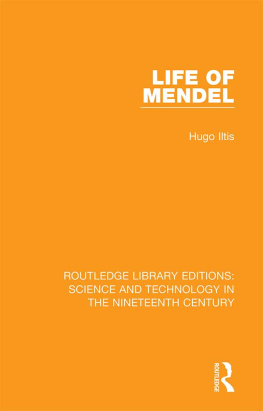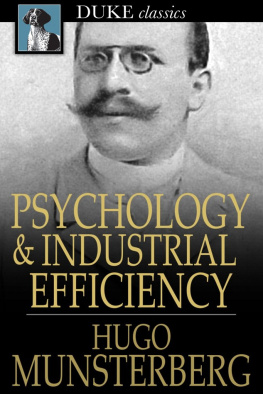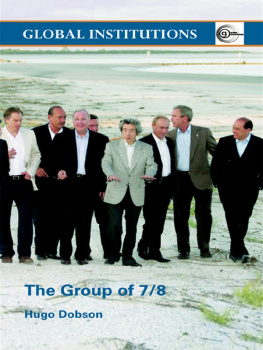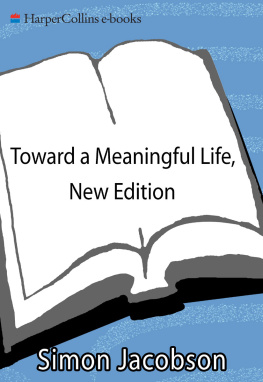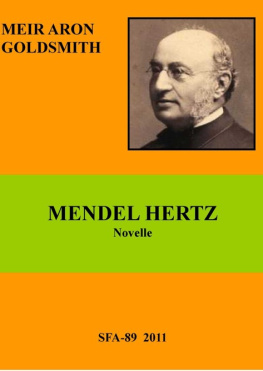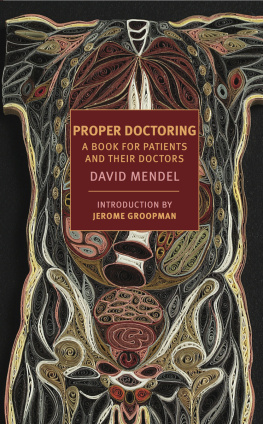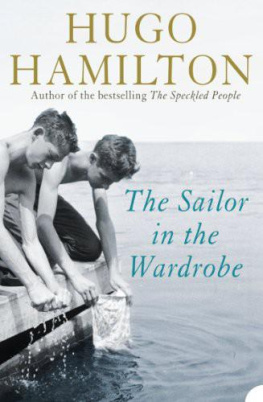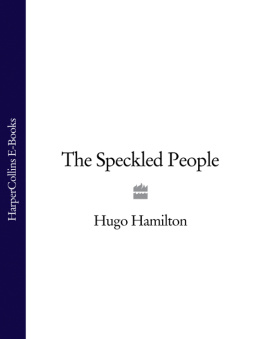First published in 1932 by Allen & Unwin
This edition first published in 2019
by Routledge
2 Park Square, Milton Park, Abingdon, Oxon OX14 4RN
and by Routledge
52 Vanderbilt Avenue, New York, NY 10017
Routledge is an imprint of the Taylor & Francis Group, an informa business
1932 Hugo Iltis
All rights reserved. No part of this book may be reprinted or reproduced or utilised in any form or by any electronic, mechanical, or other means, now known or hereafter invented, including photocopying and recording, or in any information storage or retrieval system, without permission in writing from the publishers.
Trademark notice: Product or corporate names may be trademarks or registered trademarks, and are used only for identification and explanation without intent to infringe.
British Library Cataloguing in Publication Data
A catalogue record for this book is available from the British Library
ISBN: 978-1-138-39006-5 (Set)
ISBN: 978-0-429-02175-6 (Set) (ebk)
ISBN: 978-0-367-02402-4 (Volume 3) (hbk)
ISBN: 978-0-429-39979-4 (Volume 3) (ebk)
Publishers Note
The publisher has gone to great lengths to ensure the quality of this reprint but points out that some imperfections in the original copies may be apparent.
Disclaimer
The publisher has made every effort to trace copyright holders and would welcome correspondence from those they have been unable to trace.
The German original of this work, entitled Gregor Johann Mendel, Leben,
Werk und Wirkung, was published in 1924 by Julius Springer, Berlin
FIRST PUBLISHED IN ENGLISH IN 1932
All rights reserved
PRINTED IN GREAT BRITAIN BY
UNWIN BROTHERS LTD, WOKING
FEW publications have so enduringly and variously influenced science as has the short monograph by the Augustinian monk of Brnn, Pater Gregor Mendel. Forgotten for decades, within a few years after its rediscovery it gave a mighty impetus to the doctrine of heredity; and, as mendelism, his teaching has now become the central theme of biological research as well as the foundation of manifold practical applications.
The widespread influence of his work and his own remarkable destiny combine to arouse interest in the personality and the life of this investigator who, little known in his lifetime, was one of the pioneers of science, and disclosed an unknown land before the time was ripe. It is all the more surprising that no detailed biography has hitherto been published, the sole data as yet available being contained in minor notices issued by some of his relatives.
While still only a schoolboy I read Mendels classical monograph in the museum library of my native town of Brnn, of course without grasping its significance. When subsequently, during the days in which I was a science student, Mendels work became so widely known and his name so famous, I made up my mind to gather information regarding his life and to contribute to keeping his memory in honour. Up till now this resolve has only borne fruit in the publication of a considerable number of short articles and popular essays dealing with Mendels life and work. If only at this later date do I fulfil my purpose by the compilation of an extended biography, my excuse for the delay must be, in part that I have been much occupied with other work as a teacher of natural science in Brnn, but still more because of the interruption to all my scientific and literary activities entailed by the unhappy events of the war periodan interruption that lasted five years. At length a scientific furlough and a special pecuniary grant (for which I am indebted to the Ministry of Education in Prague) have enabled me to complete the present book.
As Mendels biographer, however, I have had to cope with other difficulties than the foregoing, difficulties arising out of the peculiar nature of the case. My subjects thoughts were almost exclusively concerned with concrete facts, since he had little inclination for abstract reflection or for sentimentalism of any kind. He never kept a diary, and his letters throw little light on the inner man. Being a priest, he had to be extremely cautious in the utterance of his philosophical views. Holding strictly to his vows, he shunned all relationships with women; and his nature was so reserved that he even found it difficult to enjoy any sort of intimacy with his clerical or monastic brethren. Above all was he a solitary during the closing years of his life, when he was overshadowed with gloom. At the time of his death it had occurred to no one least of all in the monasterythat he was a man of mark; and, naturally enough, the few documents he left behind him were heedlessly torn up or committed to the flames. The upshot was that twenty years after his death his personality had become no more than a vague memory almost effaced by time, and that trustworthy biographical data were wellnigh unattainable. I could only make the best of such materials as were forthcoming.
To Mendels nephews, Dr. Alois Schindler of Zuckmantel and Dr. Ferdinand Schindler of Botenwald, I am greatly indebted for the loan of letters and photographs and for much verbal information. Pater S. Barina, prelate of the Augustinian monastery at Brnn, has likewise been good enough to supply me with biographical information. I am also grateful for various details supplied by Pater Clemens Janetschek, the late, and Pater Dwoaek, the present incumbent of Altbrnn; by Pater Gregor Jokl, the librarian of the monastery, and by various other inmates of that institution; by Professor G. Niessl (), Professor A. Makowsky (), Professor J. Wiesner () of Vienna, and Professors Liznar and Nmec of Prague; by Dr. H. Neumayer of Vienna, Councillor Ludwig, Councillor Pfefferkorn, Herr Ullrich of Neuteschen, Dr. S. Weizmann, Dr. S. Schnhof, Professor A. Mader, Professor W. Weinberger, and various other acquaintances and pupils of Mendel referred to in the following pages. I have further to give special thanks for documents and valuable advice to Professor C Correns of Berlin, Professor O. Renner of Jena, and Dr. R. Zaunick of Dresden. Finally I must express my gratitude to Frulein Elisabeth Liebscher, who drew many of the illustrations; and to my wife and collaborator Anni Iltis (ne Liebscher) for her unwearying aid as copyist and in the correction of proofs.
HUGO ILTIS




